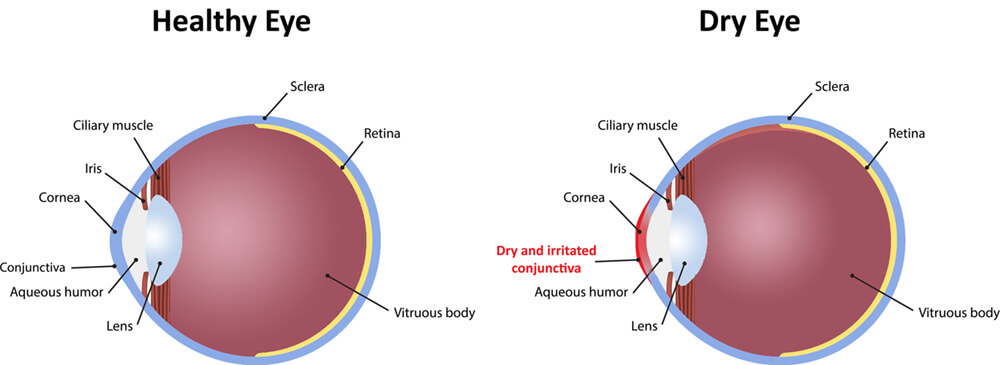Dry Eye
Dry eye is a chronic condition in which you do not produce enough tears to keep your eyes healthy and comfortable, or the quality of tears that you do produce has been compromised.
As a result, your eyes may feel irritated. You may experience a burning, slightly painful or scratchy sensation. For many, dry eye is mild and can be treated by regular use of over the counter artificial tear drops. But sometimes symptoms may become more severe making it difficult to perform every day activities.
It may feel as though you have sand in your eyes, and drops may be ineffective. Without treatment, chronic dry eye can lead to infection and impaired vision. If you are experiencing symptoms of dry eye, mild or severe, it is important to see your OCB eye doctor who can help you effectively manage your dry eye condition.

What Causes Dry Eye?
The risk of dry eye increases as we age and women are more susceptible. Other factors that contribute to dry eye can include long term contact lens use and refractive procedures, such as lasik, which can lead to decreased tear production.
Sometimes dry eye occurs when the balance of the different components that make up the tear film become offset.
Your tear film contains essentially two layers: an oily outer layer that seals in and prevents evaporation of an inner layer that is a mixture of water and mucin. The water cleanses the eye and washes away foreign particles and the mucin enables the watery layer to spread evenly over the surface of the eye and helps the eye remain moist. Without mucin, tears would not stick to the eye. When there is a disruption in the balance of oil, water and mucin, dry spots develop.
Inflammation of the duct that secretes the oils is one reason this may occur. Certain autoimmune diseases characterized by inflammation, such as lupus and rheumatoid arthritis can cause decreased tear secretion.
A wide variety of common medications, both prescription and over-the-counter, can cause dry eye by reducing tear secretion. Be sure to tell your OCB eye doctor the names of all of the medications that you are taking.
Exposure to a dry, windy climate, as well as smoke and air conditioning, which can speed tear evaporation, can exasperate the symptoms of dry eye.
There are several ways your OCB eye doctor can diagnose dry eye. In addition to noting your symptoms and using a slit lamp to examine your eyes, he or she may use a test called the Schirmer tear test to measure tear production. Dry eye can also be diagnosed with special dye drops. Your OCB eye doctor places these drops in the eyes and observes how long it takes for dry spots to develop on the cornea.
Treatment
Although there is no cure for dry eye, treatment can effectively keep symptoms under control. Treating dry eye sooner rather than later can help preserve the health of the eye and slow down any further progression of the condition.
Treatment usually involves some type of artificial tear drops sold over the counter. One may have more of an oil component and another may be more water based. What works for you depends on what’s missing from your tears. Your OCB eye doctor can help you determine what is best for you. If you find you need to use your artificial tear drops more than four times a day, it could mean you need to switch to a preservative free artificial tear drop or possibly benefit from a medication drop to treat your dry eyes. If that’s the case, your OCB eye doctor can test for the presence of inflammation, a common cause of dry eye, and prescribe drops which may reduce the inflammation.
Another alternative to help keep your eyes lubricated is to conserve your own tears. Normally, your tears drain out of the eye through a small channel in your nose. Your OCB eye doctor can perform a procedure to close the channels temporarily. With this method, plugs are inserted into the tear duct and block your eye’s drainage system.
What You Can Do at Home
To minimize the evaporation of tears, avoid exposure to dust, cigarette smoke, other irritating pollutants and try to avoid the wind. You could also try these remedies:








